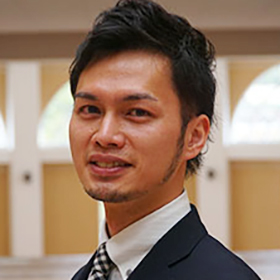About 250 people, including 9th grade students who just started to attend high school, gathered in the atrium for the first Global Career Course of this year. The Tamagawa SGH program is now in its third year. With a raised profile and better name recognition it has been attracting more and more of the students’ attention.

The instructor today was Tanabe Michihiro, who worked to support developing countries as an NGO staff member and with the Cabinet Office as an International Peace Cooperation Researcher (PKO Secretariat).
Based on his experience working in the world, he talked about “how Japanese people should show their world-class leadership”.

First, he introduced himself using photos of his youth. The students raised their voices yelling ‘cute!’when the picture was shown.
Poverty reduction in Malawi, flood support in Pakistan, and returnees’ support in South Sudan were all topics he addressed. Mr.Tanabe has visited various countries as a staff member of an NGO. Using photos, he introduced his activities in these countries.
9th grade students, who had their first chance to participate this Global Career Course, began to see what was needed for them to raise their consciousness toward what is going on around the world.


Then, he began talking about leadership.
“Japanese people are often said to not have leadership skills compared to others in the world. Let’s think of the reasons using “Hegel’s dialectic” as a hint.” He said.

Hegel’s Dialectic is a method, “that lets different opinions interact with each other to create better opinions which will not come from the original alone”.
When he was working abroad, he used this dialectic technique, to convey opinions to others, to develop a better overall shape to the work. However, he feels that Japanese people are often not good at this.

“Japanese people are not good at discussions which use dialectics, since majority of them are “reading between the lines” or “reading the situation” and not conveying their opinions clearly. They are too cautious when considering the eyes around them, ending up not saying their own opinions and showing weaker judgements and determinations. Isn’t this why Japanese are often said have weak leadership skills? I think it is necessary for Japanese people to be more aware of the need to “convey their own opinions” more. ”


He also explained features of the Japanese lifestyle using examples from recent dramas, news, and the history of Japan. The students agreed with the others sitting next to them and even students who have no experience abroad could understand his message.


On the other hand, Mr. Tanabe came across the situations when the Japanese trend of “reading the situation” came alive.
When he went to variety of developing countries, telling his own way did not work well.
“Unilaterally providing good faith initiatives to others alone will not make the local people adapt to them. He said we must learn about the people there and the features of the country, and accept it properly- than, we can finally be able to provide assistance and support.”

He then addressed the question of what is the leadership Japanese people should have.
“Give your own opinion in accordance with harmony.” Japan has an idiom “Harmony is to be valued” and people first must accept and respect their opponent from the start. While being Japanese, they should not end up by reading the situation alone, but clearly convey their own opinions to their opponent. He gave clear and valuable advice to the students.

Soon after the lecture, he received many questions.
Mr. Tanabe answered every single question and gave messages like: “If you want to go abroad, please do try”, “Outside countries are requesting things that have no precedent. Having courage to do things which no one has done before is also important”.


A board with comments post it notes from students showed many different opinions; “I want to develop leadership skills in my daily life based on what I learned today”, “I want to take action to convey things to others, rather than just trying to read the situations”, “I was able to clearly understand what leadership is and know what I should do to develop these skills”.

After Mr.Tanabe’s passionate presentation, the students left the venue with more awareness about leadership and the courage needed to proceed as a leader.




